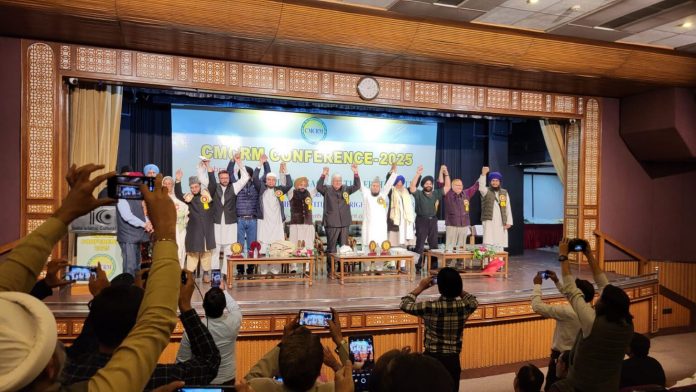New Delhi – The need for stronger Muslim-Sikh unity was underscored at the Combined Movement for Constitutional Rights of the Minorities (CMCRM) Conference 2025, held at the IICC Auditorium in Delhi. The conference celebrated the Malerkotla Legacy—a historical symbol of communal harmony—and brought together prominent leaders from both communities to address concerns over growing marginalization.
Delivering a powerful speech, Giani Kewal Singh, former Jathedar of Takht Sri Damdama Sahib, voiced his disappointment over the erosion of equality in India. “The Constitution declares all Indians equal, yet in practice, we continue to feel cheated. Even after 75 years of independence, our rights remain under threat,” he lamented. He recalled the sacrifices of Sikhs and Muslims in India’s freedom struggle, adding, “We fought for this country, yet today we are forced to struggle on the streets for our rights.”
Former Delhi Sikh Gurdwara Management Committee president Sardar Paramjit Singh Sarna echoed the sentiment, stating, “If we do not unite, both communities will suffer. There will be attempts to divide us, but for national integrity, we must stand together.”
Renowned hockey player Aslam Sher Khan highlighted the historical strength of Muslim-Sikh collaboration, pointing to their role in India’s past victories. “True power in India lies within these two communities. History shows that when we stood together, we overcame the toughest challenges. Even in sports, when we united, we defeated all opponents, including Pakistan, to win the 1975 Hockey World Cup.”
He further reflected on the turning point in communal relations after the demolition of Babri Masjid, emphasizing the need to revive the Malerkotla Spirit to counter modern challenges.
Paramjeet Singh Gazi, editor of Sikh Siyasat, noted the shifting political landscape since 2014, stating, “A new form of governance has emerged—one that does not seek our consent but imposes its decisions, as seen in the CAA and farmers’ laws. We must recognize our true allies among oppressed communities and minorities.”
Bibi Ranjeet Kaur of the Delhi Gurdwara Prabandhak Committee recalled the trauma of the 1984 anti-Sikh riots, sharing her personal experiences of witnessing state-backed violence. “After the riots, when a particular party won by a landslide, I realized how alone we were. But today, I stand committed to the cause of Sikh-Muslim unity,” she asserted.
The conference also revisited the historic Malerkotla incident, where Nawab Sher Mohammad Khan had opposed the execution of Guru Gobind Singh’s sons, an act that cemented a bond between Sikhs and Muslims. Maulana Parry Hassan Afzal Firdosi, Mirwaiz of North Kashmir, emphasized, “That legacy of unity must be revived and expanded nationwide. Our togetherness is not an option but a necessity.”
Sardar Gurjit Singh Ghuman reinforced this view, urging the communities to recognize their collective strength. “Nawab Sher Mohammad Khan stood alone and left a lasting impact. Today, we are 224 million strong. If we unite, no one can challenge us.”
Former Chhattisgarh Police Director General M.W. Ansari called for intellectual and cultural collaboration beyond political alliances. “We must focus on cultural, academic, and economic cooperation to strengthen our communities.”
In his presidential address, Maulana Obaidullah Khan Azmi, Vice President of the All India Muslim Personal Law Board, reminded the audience of their shared history. “We were one nation before the colonial rulers divided us. They used divide-and-rule to weaken us, and today, their ‘black successors’ continue that policy. We must fight back with the same resilience with which we resisted colonial rule.”
The conference concluded with a resounding call for Muslim-Sikh unity, a revival of the Malerkotla Legacy, and collective resistance against forces threatening India’s secular fabric.




